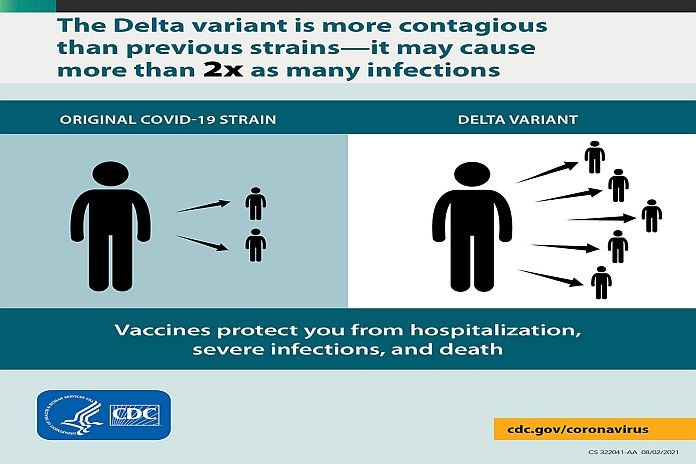ATLANTA, USA, (CDC) – On July 27, 2021, Centers for Disease Control and Prevention (CDC) released updated guidance on the need for urgently increasing COVID-19 vaccination coverage and a recommendation for everyone in areas of substantial or high transmission to wear a mask in public indoor places, even if they are fully vaccinated.
CDC issued this new guidance due to several concerning developments and newly emerging data signals. First, is a reversal in the downward trajectory of cases. In the days leading up to our guidance update, CDC saw a rapid and alarming rise in the COVID case and hospitalization rates around the country.
- In late June, our 7-day moving average of reported cases was around 12,000. On July 27, the 7-day moving average of cases reached over 60,000. This case rate looked more like the rate of cases we had seen before the vaccine was widely available.
Second, new data began to emerge that the Delta variant was more infectious and was leading to increased transmissibility when compared to other variants, even in vaccinated individuals. This includes recently published data from CDC and our public health partners, unpublished surveillance data that will be publicly available in the coming weeks, information included in CDC’s updated Science Brief on COVID-19 Vaccines and Vaccination, and ongoing outbreak investigations linked to the Delta variant.
Delta is currently the predominant strain of the virus in the United States. Below is a high-level summary of what CDC scientists have recently learned about the Delta variant. More information will be made available when more data are published or released in other formats.
Infections and spread
The Delta variant causes more infections and spreads faster than early forms of SARS-CoV-2
- The Delta variant is more contagious: The Delta variant is highly contagious, more than 2x as contagious as previous variants.
- Some data suggest the Delta variant might cause more severe illness than previous strains in unvaccinated persons. In two different studies from Canada and Scotland, patients infected with the Delta variant were more likely to be hospitalized than patients infected with Alpha or the original virus strains.
- Unvaccinated people remain the greatest concern: Although breakthrough infections happen much less often than infections in unvaccinated people, individuals infected with the Delta variant, including fully vaccinated people with symptomatic breakthrough infections, can transmit it to others. CDC is continuing to assess data on whether fully vaccinated people with asymptomatic breakthrough infections can transmit. However, the greatest risk of transmission is among unvaccinated people who are much more likely to contract, and therefore transmit the virus.
- Fully vaccinated people with Delta variant breakthrough infections can spread the virus to others. However, vaccinated people appear to be infectious for a shorter period: Previous variants typically produced less virus in the body of infected fully vaccinated people (breakthrough infections) than in unvaccinated people. In contrast, the Delta variant seems to produce the same high amount of virus in both unvaccinated and fully vaccinated people. However, like other variants, the amount of virus produced by Delta breakthrough infections in fully vaccinated people also goes down faster than infections in unvaccinated people. This means fully vaccinated people are likely infectious for less time than unvaccinated people.
Vaccines
Vaccines in the US are highly effective, including against the Delta variant
- Vaccines continue to reduce a person’s risk of contracting the virus that cause COVID-19, including this variant. The COVID-19 vaccines authorized in the United States are highly effective at preventing severe disease and death, including against the Delta variant. But they are not 100 percent effective and some fully vaccinated people will become infected (called a breakthrough infection) and experience illness. For such people, the vaccine still provides them strong protection against serious illness and death.
Masks
Given what we know about the Delta variant, vaccine effectiveness, and current vaccine coverage, layered prevention strategies, such as wearing masks, are needed to reduce the transmission of this variant:
- At this time, as we build the level of vaccination nationwide, we must also use all the prevention strategies available, including masking indoors in public places, to stop transmission and stop the epidemic.
- Vaccines are playing a crucial role in limiting spread of the virus and minimizing severe disease. Although vaccines are highly effective, they are not perfect and there will be vaccine breakthrough infections. Millions of Americans are vaccinated, and that number is growing. This means that even though the risk of breakthrough infections is low, there will be thousands of fully vaccinated people who become infected and able to infect others, especially with the surging spread of the Delta variant. Low vaccination coverage in many communities is driving the current rapid and large surge in cases associated with the Delta variant, which also increases the chances that even more concerning variants could emerge.
Source: CDC






